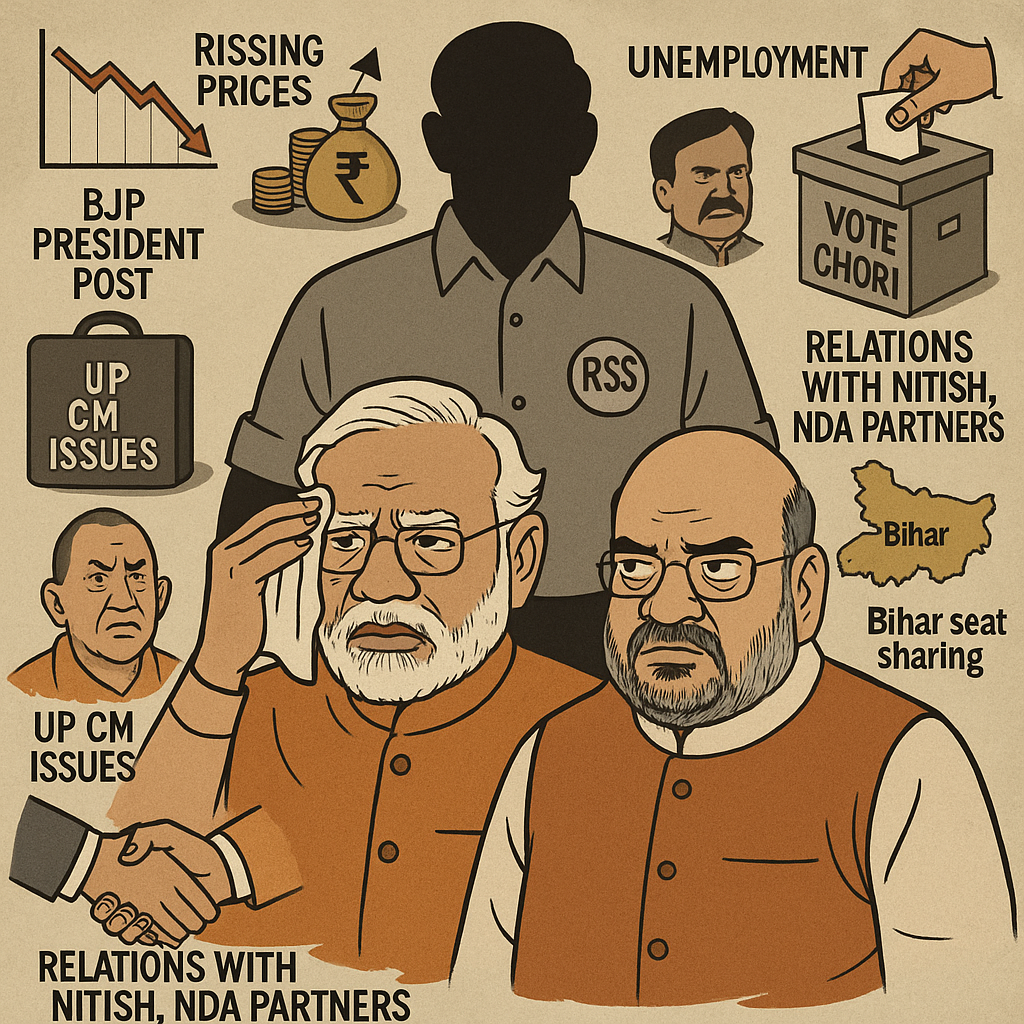India’s ruling Bharatiya Janata Party (BJP) finds itself navigating one of the most complex phases of its dominance. Prime Minister Narendra Modi and Home Minister Amit Shah, long considered invincible, are now wrestling with economic discontent, uneasy relations with the RSS, fragile alliances in Bihar, and growing international skepticism. Adding to their troubles, Rahul Gandhi’s resurgence has sharpened the opposition’s attack lines, particularly around the incendiary charge of “vote chori” (vote theft).
Economy: The persistent Achilles’ heel
Despite official GDP projections of 6.5–7% and RBI confidence in overall macro-stability, the lived reality of inflation, youth unemployment, and rural distress continues to erode public patience. The opposition has seized this gap, branding the government’s record as “numbers on paper, hunger on the ground.”
RSS factor: Modi’s final attempt at alignment
The RSS, celebrating its centenary, remains the ideological backbone of the BJP. Modi’s recent gestures of deference—consultations with Sangh leadership and policy rhetoric closer to its core agenda—are widely read as his last chance to secure their support. Without RSS’s full endorsement, analysts believe Modi’s hold over the Prime Ministership after the next election could be tenuous.
Bihar 2025: A testing ground
The Bihar election, due later this year, is shaping up as a critical trial. Nitish Kumar’s JD(U) and the BJP are locked in delicate seat-sharing talks, with allies pressing for parity. New entrants like Prashant Kishor’s Jan Suraaj Party complicate the arithmetic, while opposition parties have amplified the “vote chori” charge—alleging misuse of the Election Commission, Enforcement Directorate, Income Tax, and CBI in Bihar and nationwide to tilt the scales.
Foreign policy: From global statesman to weakened ground
Modi’s foreign policy image, once a pillar of his leadership, has visibly dulled.
- With the U.S. and Trump: Relations with Washington, particularly under Donald Trump’s second presidency, are described as uneasy. Trump’s unilateral moves on H-1B visas and trade barriers have exposed India’s vulnerabilities. Modi, once feted at “Howdy Modi” rallies with Trump, is now seen as unable to influence U.S. policy in India’s favor.
- Globally: India’s aspirations as a leading voice in G20 and BRICS remain undercut by unresolved border disputes with China and frayed ties with Canada and parts of the EU.
Rahul Gandhi: From challenger to central force
Perhaps the most striking shift in Indian politics this year has been the rising profile of Rahul Gandhi. Once dismissed as ineffective, Gandhi has sharpened his political persona through direct attacks on Modi and Shah, centering his campaign on the idea that India’s democracy has been “hijacked.”
- He has made “vote chori” a central slogan, accusing the BJP leadership of systematically undermining electoral fairness through intimidation, manipulation, and misuse of institutions.
- Gandhi’s rallies, particularly in Bihar and Uttar Pradesh, have drawn large youth turnouts, giving the opposition a new energy.
- His social media outreach and town-hall style interactions have rebranded him from a reluctant dynast into a populist challenger, making him a far more credible rival than in previous cycles.
For the first time since 2014, political observers note that Modi faces a direct, consistent, and resonant counter-narrative—with Rahul Gandhi emerging as its chief messenger.
Gadkari & Scindia: Internal unease
Senior BJP leader Nitin Gadkari has publicly denounced “smear campaigns” against him, stoking speculation about rifts within the party. Rumors persist that probes could be used as a pressure tactic. Meanwhile, in Madhya Pradesh, Scindia loyalists’ demands for his elevation underscore the latent tensions in state leadership.
The bottom line: Modi’s narrowing options
For Modi and Shah, the convergence of issues—economic pressures, RSS expectations, alliance bargaining, foreign policy setbacks, and a reinvigorated Rahul Gandhi—presents their toughest test yet. Modi’s inclination towards the RSS is seen as his final bid for organizational survival, but it may not be enough if the BJP falters in Bihar or fails to contain the “vote chori” narrative taking root nationwide.
Should the BJP win Bihar convincingly, Modi might secure a temporary reprieve. If not, the combination of internal disquiet, external criticism, and Rahul Gandhi’s rising offensive could weaken Modi’s grip—even raising questions about his ability to continue as Prime Minister.

